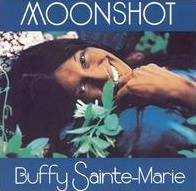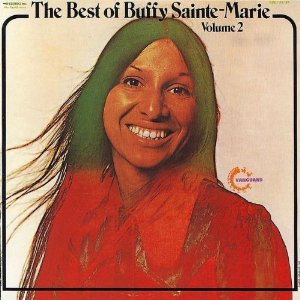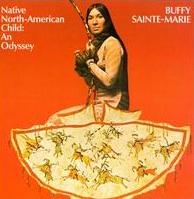
Buffy Sainte-Marie, is an American singer-songwriter, musician, and social activist.

Indigenous music of Canada encompasses a wide variety of musical genres created by Aboriginal Canadians. Before European settlers came to what is now Canada, the region was occupied by many First Nations, including the West Coast Salish and Haida, the centrally located Iroquois, Blackfoot and Huron, the Dene to the North, and the Innu and Mi'kmaq in the East and the Cree in the North. Each of the indigenous communities had their own unique musical traditions. Chanting – singing is widely popular and most use a variety of musical instruments.
"Universal Soldier" is a song written by singer-songwriter Buffy Sainte-Marie. The first released recording was a single by The Highwaymen, released in September 1963. The song was also released on Sainte-Marie's debut album It's My Way!, released in April 1964. "Universal Soldier" was not an immediate popular hit at the time of its release, but it did garner attention within the contemporary folk music community. It became a hit a year later when Donovan covered it, as did Glen Campbell. Sainte-Marie said of the song: "I wrote 'Universal Soldier' in the basement of The Purple Onion coffee house in Toronto in the early sixties. It's about individual responsibility for war and how the old feudal thinking kills us all." The idea was based on that politicians, with power over the military, in democratic states are elected by the people.

"You'll Need Somebody on Your Bond" is a gospel song that is attributed to both tradition and to gospel blues musician Blind Willie Johnson. Johnson first recorded the song in December 1930, although Delta blues musician Charley Patton recorded a similar "You're Gonna Need Somebody When You Die" in October 1929. Over the years, several other musicians have recorded renditions of the song.

The Kinzua Dam, on the Allegheny River in Warren County, Pennsylvania, is one of the largest dams in the United States east of the Mississippi River. It is located within the Allegheny National Forest.
"The Partisan" is an anti-fascist anthem about the French Resistance in World War II. The song was composed in 1943 by Russian-born Anna Marly (1917–2006), with lyrics by French Resistance leader Emmanuel d'Astier de La Vigerie (1900–1969), and originally titled "La Complainte du partisan". Marly performed it and other songs on the BBC's French service, through which she and her songs were an inspiration to the Resistance. A number of French artists have recorded and released versions of the song since, but it is better recognised globally in its significantly, both musically and in the meaning of its lyrics, different English adaptation by Hy Zaret (1907–2007), best known as the lyricist of "Unchained Melody".

Bitter Tears: Ballads of the American Indian is a 1964 concept album, the twentieth album released by singer Johnny Cash on Columbia Records. It is one of several Americana records by Cash. This one focuses on the history of Native Americans in the United States and their problems. Cash believed that his ancestry included Cherokee, which partly inspired his work on this recording. The songs in this album address the harsh and unfair treatment of the indigenous peoples of North America by Europeans in the United States. Two deal with 20th-century issues affecting the Seneca and Pima peoples. It was considered controversial and was rejected by some radio stations and fans.

It's My Way! is the first album by folk musician and songwriter Buffy Sainte-Marie. It was released in April 1964 through Vanguard Records. It was later released in Britain in early 1965 by Fontana Records. The album would become influential in the folk community. It is most famous for two widely covered folk standards, "Universal Soldier" and "Cod'ine", as well as "Now That the Buffalo's Gone", a lament about the continued confiscation of Indian lands, as evidenced by the building of the Kinzua Dam. The cover features a mouthbow, which was to be a trademark of her sound on her first three albums.

Little Wheel Spin and Spin is the third album by Buffy Sainte-Marie, released in 1966. It was her only album to reach the Top 100 of the Billboard 200. Its most famous song is "My Country 'Tis of Thy People You're Dying," which displayed a native perspective on the colonisation of North America.

I'm Gonna Be a Country Girl Again is the fifth album by singer/songwriter Buffy Sainte-Marie. As its title suggested, it saw her embrace Nashville country music with the help of session veterans such as the Jordanaires, Grady Martin, Roy M. Huskey, Jr. and Floyd Cramer. The album included re-recordings of "Now That the Buffalo's Gone" and "The Piney Wood Hills" from her first and second albums respectively. "Tall Trees in Georgia", in contrast to most of the material, showed Sainte-Marie performing in a style reminiscent of her earliest work.

Moonshot is a studio album by American singer-songwriter Buffy Sainte-Marie, released in 1972 by Vanguard Records.

Quiet Places is Buffy Sainte-Marie's ninth album and her last for Vanguard Records, with whom she had had a very strained relationship ever since the financial disaster of the experimental Illuminations. In fact, her next album, Buffy, had already been recorded before Quiet Places was actually released and was not to find a label for many months after she had completely broken with Vanguard.

The Best of Buffy Sainte-Marie Vol. 2 is a compilation double album released by Vanguard Records in 1971 covering a large proportion of the material she had released on her first six albums for the label that was not found on the previous year's The Best of Buffy Sainte-Marie.

Native North American Child: An Odyssey is a 1974 compilation album released after Buffy Sainte-Marie's departure from Vanguard Records.

"Until It's Time for You to Go" is a song from the 1965 album Many a Mile by American singer-songwriter Buffy Sainte-Marie. Sainte-Marie included a French-language reworking of the song, "T'es pas un autre", on her 1967 album Fire & Fleet & Candlelight. French translation was made by Quebecer songwriter Claude Gauthier.
"Cod'ine" is a contemporary folk song by the singer-songwriter Buffy Sainte-Marie. Considered one of the earliest anti-drug songs, Sainte-Marie wrote the piece after becoming addicted to codeine which she had been given for a bronchial infection. She recorded it for her debut album, It's My Way! (1964).

Power in the Blood is the fifteenth studio album by Buffy Sainte-Marie, released May 12, 2015, on True North Records.

William Prince is a Canadian folk and country singer-songwriter based in Winnipeg, Manitoba.
"The Circle Game" is a song by Canadian singer-songwriter Joni Mitchell composed in 1966. One of her most-covered songs, it was originally recorded by Ian & Sylvia and Buffy Sainte-Marie in 1967, and by Tom Rush for his 1968 album of the same name. Mitchell recorded it for her 1970 album Ladies of the Canyon; it also appears on her 1974 live album Miles of Aisles.
Buffy Sainte-Marie: Starwalker is a Canadian television special, which was broadcast by CBC Television and APTN on September 30, 2022. Staged at the National Arts Centre to mark the National Day of Truth and Reconciliation, the program was a tribute concert featuring musicians and dancers performing the songs of singer-songwriter Buffy Sainte-Marie, who was widely believed to be Indigenous Canadian at the time. In October 2023, an investigation by CBC News found that Sainte-Marie's claims of Indigenous identity were false, and that she was born in the United States to parents of European descent.















